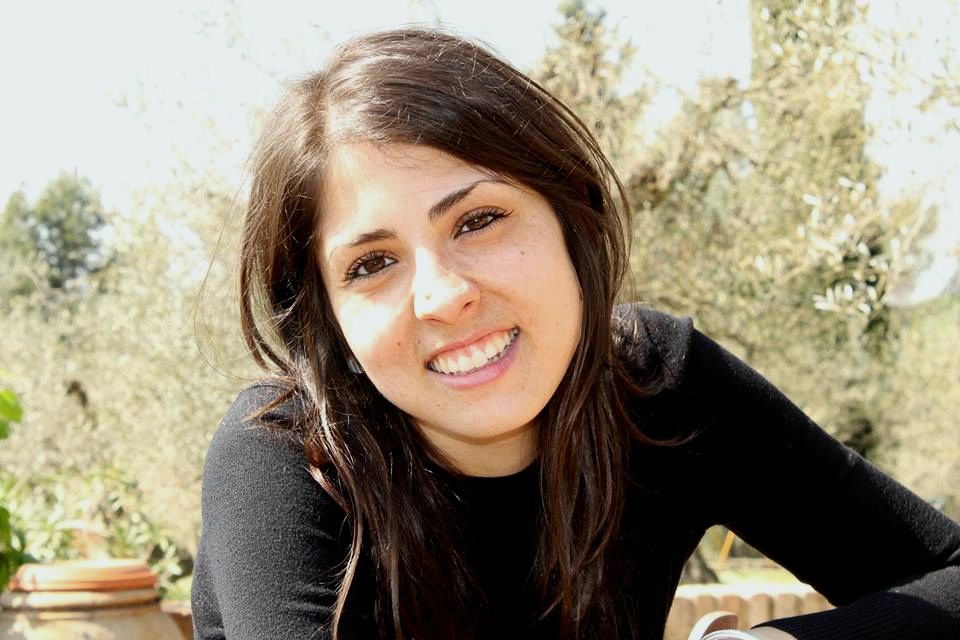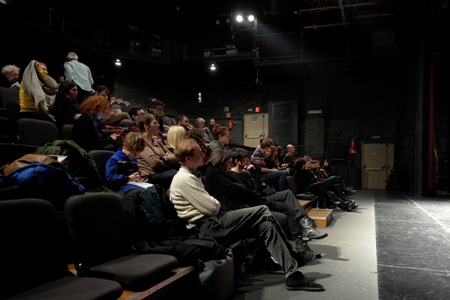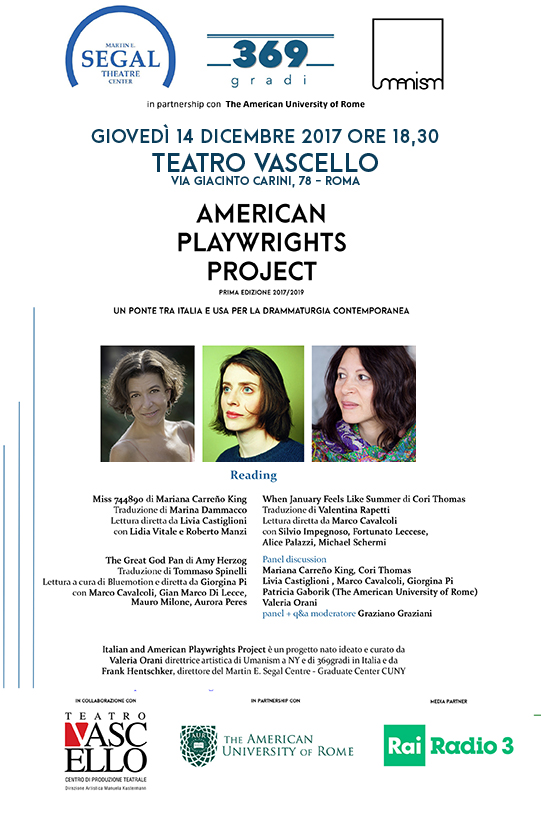On the morning of December 7, I departed from AUR’s reclusive multimedia lab where I was struggling to assemble hundreds of pictures into a cohesive animation film. As I headed for Teatro Vascello to meet Valeria Di Giuliano, the assistant project manager of the American Playwrights Project in Rome, I maneuvered among Monteverde’s residents. My thoughts reluctantly pulled away from my academic responsibilities and focused on the project that summoned me to the theater.
After passing some cafes, flower stands, and mini markets, I entered Teatro Vascello and walked towards its tiny bar to meet Valeria. We had previously met at AUR’s horror film festival in November, but now had the opportunity for an enriching conversation without screams and shudders in the background. I was curious about how she became connected with the project and how it related to her academic experience. Was her current role in the Italian & American Playwrights Project always a goal or did she become involved by happenstance? Does she feel fully equipped for her job just from her educational training alone? Perhaps I could apply Valeria’s insights to my own professional and academic understandings.
A brief scan of the room confirmed my early arrival; there was no Valeria in sight, so I planted myself at a table in front of the largest window, perfectly positioning myself as I waited for her. My eyes wandered around the cozy space and were arrested by thick, curly letters gently ascending across the wall. The name ‘Ernest Hemingway’ rested below the Italian script. Hemingway’s presence inside the little Vascello theater surprised me, but also hinted at the possibility of a harmonious relocation of an American artform into an Italian setting. I stared at the quotation, struggling to decipher it, and waited for Valeria with prickling anticipation.
After several minutes, Valeria approached my table with a bright smile and the buzzing energy that usually accompanies work and purpose. I stood up to welcome her, but my uncertainty about whether we would shake hands or kiss each other’s cheeks ruined my smooth greeting. After a blur of clumsy out-stretched hands and hesitant leaning-ins, Valeria and I settled across from each other, and she proceeded to provide essential contextual information about the Italian & American Playwrights Project. She explained that the project’s name reflects a cultural and theatrical exchange of Italian and American plays that occurs in both Rome and New York. The Italian Playwrights Project first manifested in New York in 2015 from a desire for a stronger, interactive Italian theatrical presence, which had been lacking for the past thirty years compared to the reception of other European theatrical works. The birth of the Italian Playwrights Project involved a collaboration between the Martin E. Segal Theatre Center at CUNY and Valeria Orani, who has roots in both New York (as the artistic director of Umanism) and in Rome (as the director of 369gradi). Together, Orani and the Martin E. Segal Theatre Center initiated a project that exposed and promoted Italian playwrights in New York, which included translating Italian plays into English, performing the plays with American actors, and publishing the translated plays.

Valeria, a native of Rome, then explained to me that she had studied acting for four years and loved anything connected with theater. She has earned B.A. and M.A. degrees from Sapienza Università di Roma in Translation and Literature, focusing on the translation of Brazilian plays unpublished in Italy for her thesis. Valeria expressed that while she attended university, her professional aspirations were strictly directed towards translating plays and theatrical works. In recent years, however, she was pulled to explore and master other paths, and her original desire for translating diverged into passions for cultural communications and promoting performing arts.
I smiled when Valeria described this disassembly and redirection of her plans, reflecting on my own academic navigations. I revealed that I studied Latin in high school and am also intrigued by the translation process. These studies (which developed into an interest in archeology and the decision to attended AUR to pursue archeology and Classics, but resulted in the admission to my writing aspirations) initially secured a linear, indisputable vision that quickly disintegrated. “I’ve learned not to blindly pursue a particular goal without considering other options,” I told her. Valeria nodded her head in agreement, advising “that students [should be] flexible in exploring other possibilities, that they don’t remain fixed on the career they expected to have.” Valeria expressed that if students are open to other possibilities, they “can find interests, passions and opportunities” they were not aware of.
Our conversation flowed steadily and naturally, and so I resisted disengaging my eyes from Valeria’s to scribble notes. By the time she described her early encounters with the project, I had not touched my pen and my notebook remained blank. I dismissed their useless presence as Valeria recollected her fateful journey to New York and its uncharted repercussions. In 2016, she traveled to New York for vacation, where she discovered the event of the Italian Playwrights Project dedicated to Stefano Massini. At this event, Valeria connected with Valeria Orani, who engaged her related passions for cultural promotions and communications. Valeria claimed she immediately empathized with Orani, joking that it was perhaps because they have the same name. After meeting, Orani asked Valeria to coordinate the Italian Playwrights Project’s sister initiative along with 369gradi, the American Playwrights Project in Rome. By promoting American playwrights in Rome, the American Playwrights Project completes the reciprocal exchange of Italian and American culture and theater. The Italian & American Playwrights Project’s appreciation of both Italian and American artforms in the United States and Italy attracts the similar interests of AUR, hence AUR’s partnership with Umanism, 369gradi, Teatro Vascello, and the Martin E. Segal Center.

Similarly to the Italian Playwrights Project’s process in New York, the American Playwrights Project selects American plays, translates them into Italian, and performs them with Italian actors. Valeria described that Orani’s job offer was a dream come true, since it allowed her to connect with the worlds of both American and Italian theater. Valeria currently works as the contact person of the American Playwrights Project, an intermediary communicator between Umanism, AUR, and 369gradi, and a translator.
In December 2017, Valeria assisted Orani and 369gradi in organizing the first American Playwrights Project event in Rome by communicating between actors, directors and the guest playwrights. The premier of the American Playwrights Project’s took place on December 14th at Teatro Vascello and welcomed the two American playwrights who were selected for the project. Excerpts of their plays were performed with Italian actors, and afterwards a panel of the actors, playwrights, Valeria Orani, and AUR professor Patricia Gaborik discussed the project (read Gaborik’s interview and view pictures of the event here). The event was also recorded by the same students who shot the winning film of the AUR horror film festival.
After processing Valeria’s current role within the project, I delved into the vacation to New York that sparked Valeria’s current work. I deeply connected with her experience of navigating another country and explained that I come from a small town in Pennsylvania, where families remain there for generations and many students stay in Pennsylvania after high school. Valeria laughed, admitting that she perceives Rome in a similar way. She feels that most Italians do not see a need to travel beyond their home, and that social networking is not as emphasized in Italy as it is in America. When she was in New York, she realized the importance of connecting with new people and sharing ideas, and directly experienced how networking could propel her personal and professional life.
When I asked Valeria if her university education prepared her for her time in New York and for her current position, she explained that her focus on translating “prepared [her] for the real world only partially.” Valeria professed that she would not feel as qualified for her current position if she did not attend university since it taught her how to manage deadlines and work under pressure. Her university experience certainly provided a solid foundation for organizational skills, but it is only one element that contributed to her success.

Valeria explained that, in her opinion, “Italian university doesn’t prepare the student enough for the real working reality, it is often too theoretical and not technical enough.” Her statement immediately resonated with me. After living in Rome for a year and a half, I realize that seizing opportunities to speak with professionals like Valeria are essential for networking and gaining insights that I could not gain from a classroom environment. Valeria believes that American universities utilize a more technical and practical approach, especially through student internships and work study experience, such as the one I was fulfilling. In addition to attending university, Valeria took the initiative to study the world of theatre and gain real life experience, like traveling to New York, to complement her theoretical foundation. Besides having an academic background, Valeria stressed that having skills such as goal setting, being a positive team player, and an awareness of public relations also contribute to success in the professional world.
By the end of our conversation, my notebook and pen were long deserted and only our espresso cups remained on the table. Valeria’s personal insight into the project not only untangled its complex origins but allowed me to relate to it more authentically as a student. Listening to her reflections about education and its impact on her own professional life encouraged me consider more writing opportunities outside of the classroom. After we concluded our conversation, I left the café decorated with Hemingway’s words and retraced my invisible path to the university.









